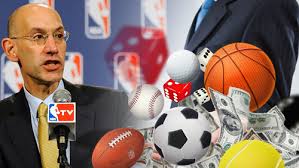 Within his first full year as NBA commissioner, Adam Silver (“Silver”) has made headlines more than once. “Since replacing David Stern as NBA commissioner in February of 2014, Silver has shown an uncanny knack for making a bold stance at the exact right time. He has shown a shrewdness in picking causes which cement his reputation as the most forward-thinking commissioner in major pro sports while positioning his league to benefit financially.”[1]
Within his first full year as NBA commissioner, Adam Silver (“Silver”) has made headlines more than once. “Since replacing David Stern as NBA commissioner in February of 2014, Silver has shown an uncanny knack for making a bold stance at the exact right time. He has shown a shrewdness in picking causes which cement his reputation as the most forward-thinking commissioner in major pro sports while positioning his league to benefit financially.”[1]
In a New York Times Op. Ed. on November 14, 2014, Silver opined that:
But despite legal restrictions, sports betting is widespread. It is a thriving underground business that operates free from regulation or oversight. Because there are few legal options available, those who wish to bet resort to illicit bookmaking operations and shady offshore websites. There is no solid data on the volume of illegal sports betting activity in the United States, but some estimate that nearly $400 billion is illegally wagered on sports each year.
Times have changed since Paspa [Professional and Amateur Sports Protection Act of 1992] was enacted. Gambling has increasingly become a popular and accepted form of entertainment in the United States. Most states offer lotteries. Over half of them have legal casinos. Three have approved some form of Internet gambling, with others poised to follow.
There is an obvious appetite among sports fans for a safe and legal way to wager on professional sporting events. Mainstream media outlets regularly publish sports betting lines and point spreads. Voters in New Jersey overwhelmingly voiced their support for legal sports betting in a 2011 referendum. Gov. Chris Christie of New Jersey recently signed a bill authorizing sports betting at local casinos and horse racetracks, a law the N.B.A. and other leagues have opposed — and a federal court has blocked — because it violates Paspa.
Outside of the United States, sports betting and other forms of gambling are popular, widely legal and subject to regulation. In England, for example, a sports bet can be placed on a smartphone, at a stadium kiosk or even using a television remote control.
In light of these domestic and global trends, the laws on sports betting should be changed. Congress should adopt a federal framework that allows states to authorize betting on professional sports, subject to strict regulatory requirements and technological safeguards.
These requirements would include: mandatory monitoring and reporting of unusual betting-line movements; a licensing protocol to ensure betting operators are legitimate; minimum-age verification measures; geo-blocking technology to ensure betting is available only where it is legal; mechanisms to identify and exclude people with gambling problems; and education about responsible gaming.
Without a comprehensive federal solution, state measures such as New Jersey’s recent initiative will be both unlawful and bad public policy.
Let me be clear: Any new approach must ensure the integrity of the game. One of my most important responsibilities as commissioner of the N.B.A. is to protect the integrity of professional basketball and preserve public confidence in the league and our sport. I oppose any course of action that would compromise these objectives.
But I believe that sports betting should be brought out of the underground and into the sunlight where it can be appropriately monitored and regulated.[2]
This is a fairly progressive view in that no professional sports league in the United States has authorized or has ever publicly supported gambling in any way on its sport. In response to Silver’s statements, NHL “Commissioner Garry Bettman offered the following dismissive reply to Silver: Do you want people at football and basketball games rooting for the spread or rooting for their favorite team?”[3] Paul Beeston, President of the Toronto Blue Jays said: “Why would you put yourself in a position where you could have any type of question about the integrity of your game, whether [betting] is regulated or not regulated?”[4]
“It may seem like a no-brainer for a major sports league to back legalized gambling. But Silver clearly saw the NBA was in the perfect position to take the lead. We are not going to see the NFL’s Goodell take anything that could be even remotely considered a controversial stance this season, or possibly ever. MLB, at least since the 1919 Black Sox scandal, has made “thou shalt not gamble” its main commandment.”[5]
The sport of basketball has had isolated instances in the past with alleged gambling activities including college point shaving scandals, gambling addictions of his “Airness,” gambling losses accumulated by Charles Barkley, Charles Oakley-Tyrone Hill dice war and Antoine Walker’s Las Vegas gambling debts and bankruptcy.
There are certainly some concerns with a professional sports league publicly supporting gambling on its games. The possibility of players themselves influencing the outcomes of games is a scary proposition for a league. Uncertain outcomes of games keep fans interested and create an atmosphere where fans are rooting for their team to win; not rooting for a specific betting line. “The fear isn’t so much that professional sports games would be rigged; it is that the fundamental nature of the fan experience would change. Imagine yourself in an arena filled with people just as interested in covering a point spread as in cheering for their hometown’s boasting rights.”[6]
In 2007, referee Tim Donaghy, a thirteen year veteran of the NBA, sent shockwaves through the NBA. Donaghy allegedly gambled on games in which he served as a referee and resigned from his position on July 9, 2007.[7] Shortly thereafter he pled guilty to two federal charges related to point shaving and was sentenced to federal prison.[8] Then Commissioner David Stern stated that Donaghy “betrayed the most sacred trust in professional sports.”[9]
The idea of legalized, regulated betting on professional basketball is feasible and realistic. Silver himself notes an “appetite” for sports fans to safely wager on games. It is estimated that over $400 billion is wagered illegally each year. This money could be regulated and taxed by the federal government, creating positive economic growth around the country. In Silver’s words, bringing sports betting “out of the underground and into the sunlight where it can be appropriately monitored and regulated” would put the NBA in line with professional leagues in other countries where fans can place bets from their phones, at a kiosk, or even through a television remote for any game. In the end, the hope is that casinos or gaming websites would be required to pay either a licensing fee or percentage of profits to the respective league as a part of offering the betting service for fans. This could become an enormous revenue stream for the NBA.[10]
In February of 2015, the Menominee Tribe offered $220 million toward funding a new arena in downtown Milwaukee for the Milwaukee Bucks in consideration of approval by Governor Scott Walker to build a Hard Rock Casino in Kenosha, Wisconsin. The tribe proposed directing a portion of the gaming proceeds to cover what Walker had proposed as the state’s share of the arena project which included increased collections in the state’s jock tax. [11]
Portions of the proceeds from legalized gambling could be set aside to help fund the public’s contribution for future arenas and sports facilities. Therefore, it is not only the league that could benefit, but also the public in that some portion of gambling revenue could support public sector funding.
“If gambling on NBA games were to be licensed and legalized then this limitless cash flow would primarily go to the league and its owners instead of illegal bookmakers and Las Vegas.”[12] “The future wealth of the NBA brand lies not in cable TV, but in how quickly Silver can convince legislators and fans that Joe-Six-Pack is better off using his smartphone to bet on a Klay Thompson catch-and-shoot 3 than spending hours playing Candy Crush.”[13]
Therefore, it may not be just the enormous TV contracts that have inflated NBA franchise values. The future advent of legalized and regulated gambling and the resulting flows of revenue to the NBA may even have a greater long term impact than the TV contracts recently consummated.
Thank you Brycen Breazeale, a Marquette University Law School student, for his help in research and writing this post.
[1] Felt, Hunter, The Guardian, “Adam Silver’s Bet on Legal Gambling Shows NBA Chief has the Golden Touch,” November 17, 2014, http://www.theguardian.com/sport/2014/nov/17/nba-adam-silver-legal-gambling
[2] Silver, Adam, The New York Times, “Legalize and Regulate Sports Betting,” November 13, 2014, http://www.nytimes.com/2014/11/14/opinion/nba-commissioner-adam-silver-legalize-sports-betting.html
[3] Felt, Hunter, The Guardian, “Adam Silver’s Bet on Legal Gambling Shows NBA Chief has the Golden Touch,” November 17, 2014, http://www.theguardian.com/sport/2014/nov/17/nba-adam-silver-legal-gambling
[4] Felt, Hunter, The Guardian, “Adam Silver’s Bet on Legal Gambling Shows NBA Chief has the Golden Touch,” November 17, 2014, http://www.theguardian.com/sport/2014/nov/17/nba-adam-silver-legal-gambling
[5] Id.
[6] Evensen, Jay, Deseret News, “NBA’s Fight for Legal Wagering on Games is a Bad Idea,” December 31, 2014, http://www.deseretnews.com/article/865618677/NBAs-fight-for-legal-wagering-on-games-is-a-bad-idea.html?pg=all
[7] NBA Commissioner David Stern Press Conference, July 24, 2007, http://www.nba.com/news/sternpc_070724.html
[8] The Associated Press and Mike Fish, ESPN, July 30, 2008, http://sports.espn.go.com/nba/news/story?id=3509440
[9] NBA Commissioner David Stern Press Conference, July 24, 2007, http://www.nba.com/news/sternpc_070724.html
[10] Silver, Adam, The New York Times, “Legalize and Regulate Sports Betting,” November 13, 2014, http://www.nytimes.com/2014/11/14/opinion/nba-commissioner-adam-silver-legalize-sports-betting.html
[11] Kirchen, Rich, Milwaukee Business Journal, “It’s Not ‘a Bribe,’ Say Hard Rock, Menominee of $220M Arena Offer,” February 10, 2015, http://www.bizjournals.com/milwaukee/news/2015/02/10/its-not-a-bribe-say-hard-rock-menominee-of-220m.html
[12] Fynn, Sean, “NBA Source: Future Sports Betting, Not Current TV Contact, Inflated Team Values,” January 27, 2015, http://www.breitbart.com/sports/2015/01/27/nba-source-future-sports-betting-not-current-tv-contact-inflated-team-values/
[13] Id.


